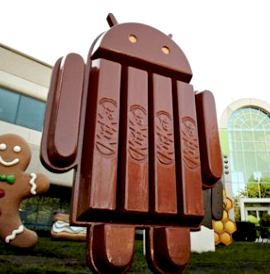 San Francisco, Sept 4: Google said the next version of Android will be called "KitKat" in keeping with its penchant for giving tasty names to its software for powering mobile devices.
San Francisco, Sept 4: Google said the next version of Android will be called "KitKat" in keeping with its penchant for giving tasty names to its software for powering mobile devices.
"Since these devices make our lives so sweet, each Android version is named after a dessert," the California-based technology titan said yesterday in a blog post.chocolate
"As everyone finds it difficult to stay away from chocolate we decided to name the next version of Android after one of our favourite chocolate treats."
The list of Android software names over the years includes Cupcake, Donut, Ice Cream Sandwich, and Jelly Bean.
In a promotion deal, Google is enticing people with chances to win Android-powered Nexus 7 tablets or credit at its online Play shop by buying KitKat candy bars featuring Android robot icons on wrappers.
Android software powers more than a billion smartphones or tablets worldwide, according to Google.
Smartphones powered by Google's Android software increased their global market share as iPhones lost ground in the absence of new models being unleashed by Apple, the International Data Corporation reported last month.
Android's share of the smartphone market grew to 79.3 per cent in the second quarter while that of iPhone slipped to 13.2 per cent from 16.6 per cent in the same three-month period last year, according to IDC figures.
Apple is "well positioned" to recapture market share with the release later this year of a new iPhone and the next-generation iOS mobile operating system, according to IDC mobile phone research team manager Ramon Llamas.
Apple yesterday sent out invitations to a September 10 event at its California headquarters where new iPhones models were expected to be unveiled.
KitKat is a chocolate-covered wafer created by British-based Rowntree's, now produced worldwide by Nestle.





Comments
Add new comment